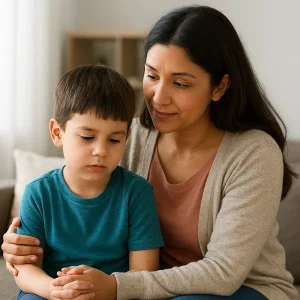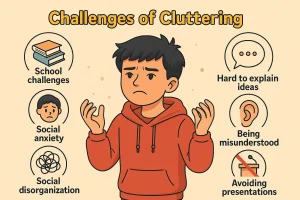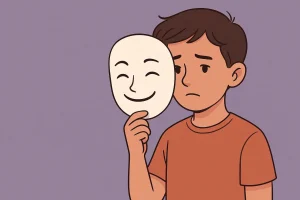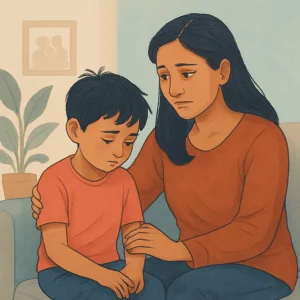Fun WH Questions Activities for Kids: Learn Through Play
By Rajini D
Last Updated: February 5, 2025
WH questions—starting with ‘who,’ ‘what,’ ‘when,’ ‘where,’ ‘why,’ and ‘how’—are pivotal for developing children’s communication skills. They prompt critical thinking and meaningful responses. WH Questions Activities for Kids use these questions in fun, engaging ways. This approach fosters cognitive, social, and emotional growth naturally. Through playful interactions, kids learn to inquire and communicate effectively. They also enjoy exploring their world, making learning both impactful and delightful.
Why Choose Play-Based Learning for Teaching WH Questions?
Interactive Learning: A Key to Engagement
- Play-based learning turns lessons into fun activities.
- Kids stay interested and engaged, helping them absorb and apply knowledge effectively.
Cognitive and Language Skill Enhancement
- WH questions encourage children to think deeply and ask about cause and effect, like “Why does the ball bounce?”
- This method boosts reasoning, memory, and comprehension.
- Practicing WH questions through play helps children develop communication skills naturally.
Benefits with Wellness Hub
- Wellness Hub’s resources integrate play to make learning enjoyable and effective.
- Our tools are crafted to stimulate curiosity and support overall development in a fun-filled way.
Also read: WH Questions Examples for Kids: How to Teach with Fun Activities
Enhancing Language Skills Through Play
The Role of Play in Language Development
Play isn’t just a way for kids to have fun—it’s also crucial for their language development. When children engage in play, they’re not just moving toys around; they’re telling stories, solving problems, and learning to express their thoughts and feelings. This natural interaction in playful settings allows children to practice new words and phrases in a context that makes sense to them, facilitating easier learning and retention.
How Play Facilitates Better Questioning Skills
- Role-Playing Games: Through role-playing, children simulate real-life situations where they naturally use and respond to WH questions. For example, while pretending to be doctors, they might ask, “What hurts?” or “How did this happen?” This not only improves their questioning ability but also their responses.
- Storytelling Activities: When kids tell or listen to stories, they engage with questions like “What will happen next?” or “Why did the character do that?” This encourages them to think critically and formulates their own questions, enhancing their narrative skills.
- Interactive Play: Games that require players to ask questions to progress, like treasure hunts or mystery games, directly build questioning skills. “Where is the clue hidden?” or “What do we need to find next?” are questions that push children to use their language skills actively and thoughtfully.
Top WH Questions Activities for Enhanced Learning
Introducing children to WH questions through play is a fantastic way to boost their language and thinking skills. Here are some engaging activities designed to make learning how to use WH questions both fun and effective:
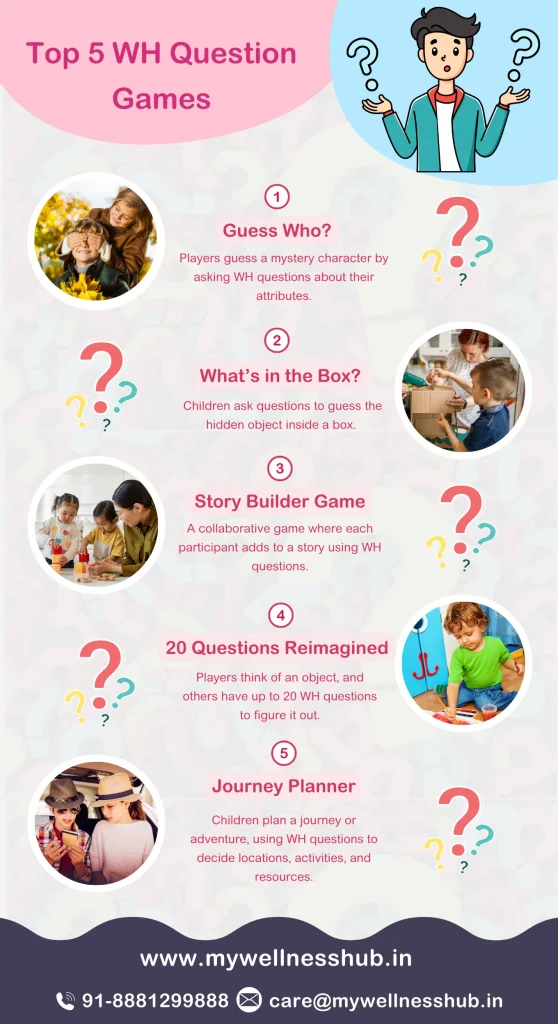
1. Treasure Hunt Adventures
- Activity Setup: Create a map with clues scattered around your home or classroom.
- Learning Goal: Each clue should be a WH question that leads to the next clue, like “Where can you find something cold?” or “What makes a noise when it rings?”
- Skill Development: This game improves children’s understanding of question context and encourages them to think critically about where and why things are the way they are.
2. Story Builder Game
- Activity Setup: Start a story and ask the child to continue, prompting them with WH questions such as “What happens next?” or “Why did the character do that?”
- Learning Goal: To expand the story creatively using questions and answers.
- Skill Development: Enhances narrative skills and understanding of cause and effect within stories.
3. What’s in the Box?
- Activity Setup: Place an object in a box and have children ask questions to guess what it is without looking.
- Learning Goal: They can only use WH questions, like “Is it something we use at school?” or “What color is it?”
- Skill Development: Sharpens sensory deduction skills and understanding of descriptive language through questioning.
4. Cooking with Questions
- Activity Setup: Involve children in a cooking activity where they have to ask questions about each step.
- Learning Goal: Questions might include “What ingredients do we need?” or “Why do we cook it at this temperature?”
- Skill Development: Teaches sequence, timing, and reasoning, alongside practical life skills.
5. Role-Play Interviews
- Activity Setup: Children take turns being different characters, and others interview them using WH questions.
- Learning Goal: For example, one could be a firefighter, and others ask, “What do you wear to work?” or “How do you help people?”
- Skill Development: Enhances understanding of different roles in society and the use of appropriate questioning.
Also Read: Why WH Questions Matter for Kids and How to Teach Them
Interactive WH Question Games for Children
Engaging Kids with Fun WH Question Games
WH question games are not just educational; they’re a blast for kids! These games are designed to seamlessly integrate learning with play, ensuring that children enjoy themselves while enhancing their questioning and reasoning skills. Here are some fantastic WH question games along with tips to keep them educational and fun:
1. Guess Who?
- Game Description: This classic game involves guessing a mystery character by asking yes or no questions. Adapt it to WH questions by allowing questions like “What does your character wear?” or “Where might your character work?”
- Tips for Fun Learning:
- Use pictures of characters with varied, colorful backgrounds to spark interest.
- Encourage children to ask detailed questions to narrow down the possibilities.
2. What’s the Story?
- Game Description: In this game, a player thinks of a scenario or a story, and others have to figure out the story by asking WH questions only, such as “Who is the main character?” or “What is the problem?”
- Tips for Fun Learning:
- Include prompts or story starters to help younger children participate effectively.
- Use a timer to make the game more exciting and fast-paced.
3. 20 Questions Reimagined
- Game Description: Traditionally played by guessing an object through 20 questions, switch it up by requiring only WH questions, such as “What color is it?” or “Where do you find it?”
- Tips for Fun Learning:
- Choose objects that are familiar yet challenging enough to stimulate thought.
- Keep a scoreboard for added excitement and healthy competition.
4. The Riddle Me This Game
- Game Description: Create riddles that the kids need to solve using WH questions. For example, “I have keys but open no locks, I have space but no room, you can enter but can’t go outside. What am I?”
- Tips for Fun Learning:
- Make the riddles age-appropriate to keep children motivated and not frustrated.
- Encourage teamwork by having kids work in pairs or small groups to solve the riddles.
5. Journey Planner
- Game Description: Children plan a journey to a mystery destination using WH questions to determine the location, means of transportation, and activities. For instance, “Why would you go there?” or “What can you do once you arrive?”
- Tips for Fun Learning:
- Introduce maps and travel brochures for a realistic planning experience.
- Discuss different cultures and locations as part of the game to broaden knowledge.
Play-Based Projects to Encourage Curiosity
Fostering Curiosity with Project-Based Learning
Project-based learning is a fantastic way to harness children’s natural curiosity and encourage deep engagement with educational content through WH questions. Here are some engaging project-based activities that incorporate WH questions, complete with steps and guidelines to help parents and educators facilitate these learning experiences effectively.
1. Build Your Own Mini Ecosystem
- Project Overview: Children create a small ecosystem in a terrarium or aquarium and use WH questions to guide their learning and decisions.
- Steps to Follow:
- Choose the Environment: Decide whether to create a land-based or aquatic ecosystem.
- Research: Encourage children to research using questions like, “What plants and animals thrive in this environment?” and “Why do these species live well together?”
- Assemble: Collect all necessary materials and construct the ecosystem.
- Observe and Learn: Use WH questions to observe changes, e.g., “What happens if I add more plants?” or “Why is the water level decreasing?”
- Educational Tips: Guide children to document their findings in a journal, encouraging them to write down their observations and the WH questions they ponder.
2. Time Capsule Project
- Project Overview: Students create a time capsule that represents their current life and times, using WH questions to select items and explain their choices.
- Steps to Follow:
- Item Selection: Use WH questions to decide what to include, such as “Why does this item represent today’s technology?” or “What makes this toy my favorite?”
- Documentation: Have children write explanations for each item using WH questions.
- Seal and Bury: Choose a spot to bury the time capsule and discuss questions like “When should we open this?” and “Who might find it if we forget?”
- Educational Tips: This project teaches children about historical documentation and the importance of personal and cultural artifacts.
3. Community Helper Interview
- Project Overview: Children prepare and conduct interviews with community helpers like firefighters, doctors, or teachers using WH questions to learn about their roles.
- Steps to Follow:
- Prepare Questions: Help children come up with a list of WH questions such as, “What does your day look like?” or “How do you help people in our community?”
- Conduct Interviews: Visit or video call the community helper and ask the prepared questions.
- Reflect: Have children present what they learned to their peers or family.
- Educational Tips: Encourage children to think critically about the roles and responsibilities of different community members.
Role-Playing Scenarios Using WH Questions
Engaging Children with Role-Playing Games
Role-playing games are a dynamic way to teach children the art of asking and answering WH questions. These games allow children to step into different roles, encouraging them to explore various scenarios while using language in a meaningful context. Here’s how role-playing can significantly enhance children’s ability to handle WH questions and why it’s a fun, effective educational tool.
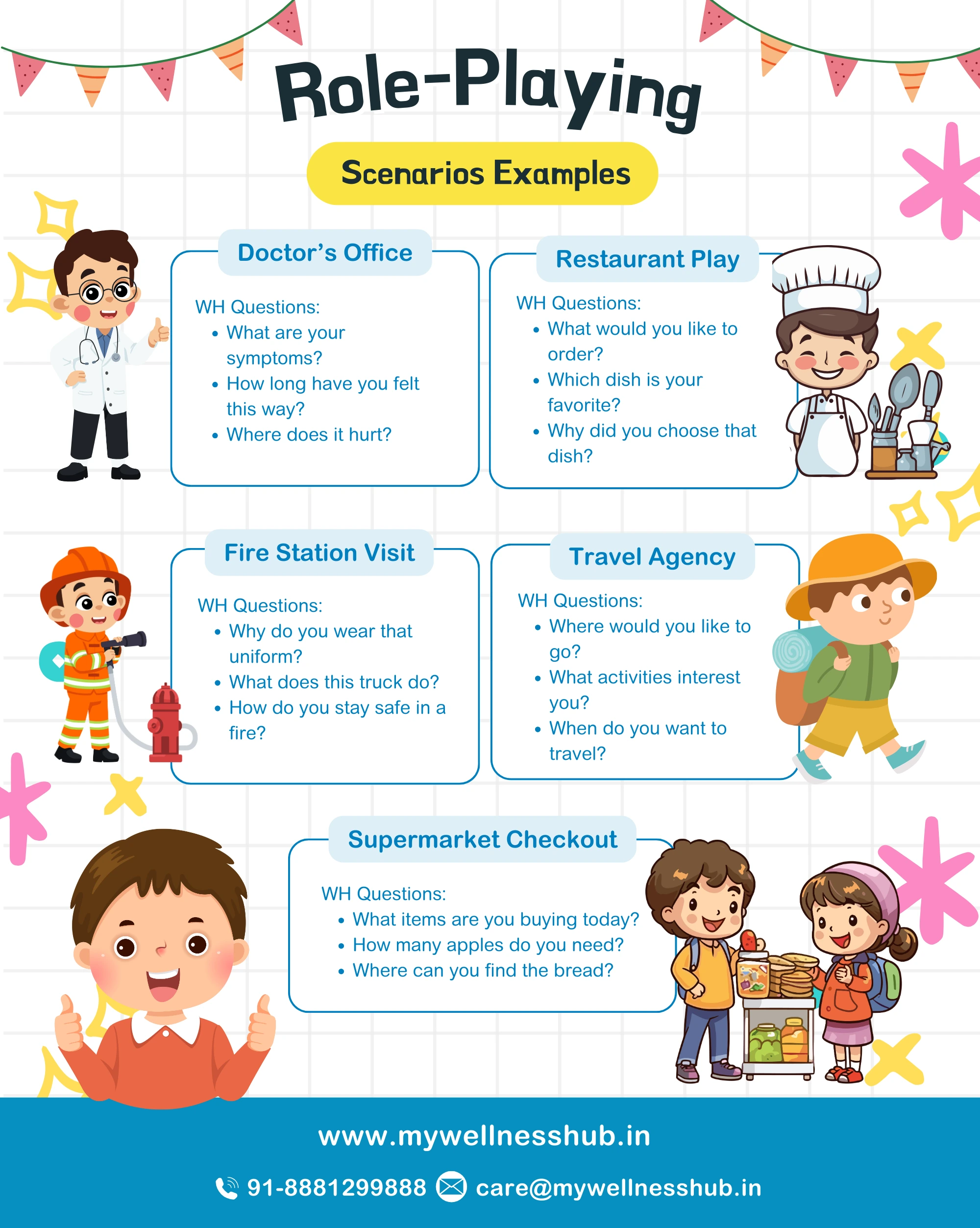
Creating Effective Role-Playing Scenarios
- Choose a Theme: Start with a familiar scenario, like a grocery store, restaurant, or doctor’s office. This familiarity helps children feel comfortable and stimulates more natural interactions.
- Assign Roles: Each child takes on a role, such as shopkeeper, chef, doctor, or customer. Rotate roles to give each child a chance to ask and answer different types of questions.
- Prepare Prompt Cards: Use cards with WH questions relevant to the scenario, like “What would you like to order?” for a restaurant or “Where does it hurt?” in a medical play setup.
Benefits of Role-Play in Learning
- Enhances Language Skills: As children engage in these scenarios, they naturally use WH questions and answers, which helps improve their vocabulary and sentence structure.
- Develops Social Understanding: Role-playing allows children to understand different perspectives and contexts, fostering empathy and social awareness.
- Boosts Problem-Solving: Encountering and resolving scenarios in role-play develops critical thinking and decision-making skills.
Making Role-Playing Fun and Educational
- Encourage Creativity: Let children come up with their own scenarios or twists on the game. This involvement boosts engagement and makes learning more enjoyable.
- Use Props and Costumes: Simple props and costumes can make the role-play feel more real and exciting, helping children immerse themselves in the roles they are playing.
- Reflect on the Experience: After role-playing, discuss with the children what they learned from the experience. Ask questions like “What did you learn from being the shopkeeper?” or “How did it feel to help someone in the doctor role?”
Conclusion:
Discover the joys of play-based learning at Wellness Hub! By integrating WH questions into fun activities, we help children develop crucial skills—enhancing their communication, critical thinking, and social interactions. Our interactive tools and resources make learning an exciting adventure, encouraging children to explore new concepts with curiosity and enthusiasm. Visit Wellness Hub to find activities and materials that support every step of your child’s educational journey, making learning not only effective but truly enjoyable.
Frequently Asked Questions:
1. What are WH questions in child learning?
WH questions include ‘who,’ ‘what,’ ‘when,’ ‘where,’ ‘why,’ and ‘how.’ They help children develop critical thinking and communication skills by encouraging more detailed responses.
2. Why is play-based learning important for kids?
Play-based learning uses games and activities to teach concepts, making learning enjoyable and effective. It helps children improve their cognitive, social, and emotional skills through engaging, interactive experiences.
3. How can I teach my child to use WH questions?
Start by modeling WH questions in everyday conversations. Use simple, fun games and activities like ’20 Questions’ or storytelling games that encourage your child to ask and answer using WH questions.
4. What are some simple WH question games I can play at home?
Try games like ‘What’s in the Box?’ where your child asks questions to guess hidden objects, or ‘Role-Play Interviews’ where they pretend to be different characters and ask questions about their roles.
5. Can play-based learning improve my child’s language skills?
Yes, play-based learning significantly enhances language development by allowing children to practice new words and phrases in a meaningful context, which helps in better retention and understanding.
6. What role do WH questions play in a child’s education?
WH questions encourage children to think beyond basic facts, exploring deeper understanding and improving their ability to communicate effectively in both academic and everyday settings.
7. How does role-playing help children learn WH questions?
Role-playing lets children practice WH questions in varied scenarios, which enhances their ability to understand context, develop empathy, and improve their questioning and answering skills.
8. What are some tips for creating engaging play-based learning activities?
Use themes your child is interested in, incorporate props and costumes for realism, and ensure activities are age-appropriate to keep them challenging yet achievable.
9. How often should I engage my child in WH questions activities?
Regular engagement, such as a few times a week, is ideal as it helps reinforce learning and keeps the skills fresh in your child’s mind. Adjust frequency based on your child’s interest and response.
10. Where can I find resources for play-based learning activities?
Check out Wellness Hub for a wide range of educational tools and resources designed to support play-based learning, offering fun and educational products that help children master WH questions and other key skills.
About the Author:
Rajini Darugupally
M.Sc., Speech-Language Pathologist (9+ years of experience)
Rajini is a passionate and dedicated Speech-Language Pathologist with over 9+ years of experience, specializing in both developmental speech and language disorders in children and rehabilitation in adults. Driven by a desire to empower each individual to find their voice, Rajini brings a wealth of experience and a warm, genuine approach to therapy. Currently, at Wellness Hub, she thrives in a team environment that values innovation, compassion, and achieving results for their clients.
Book your Free Consultation Today
Parent/Caregiver Info:
Client’s Details:
* Error Message
